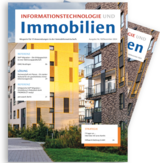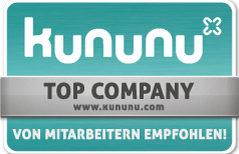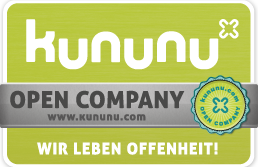Co-working – Find a workspace and network at the click of a mouse

The concept of co-working is a response to the increasing flexibility of our working world that opens up new opportunities for creative industries in both urban and rural areas. The digitisation seen in all areas of life forms the basis of this process, thus having an outsize impact on professional life. Companies can program and deploy work and business processes to move activities and projects online – from home and from anywhere.
Nonetheless, this mobility is also increasing the need for temporary workstations where employees must be present. This completely new form of work is referred to as co-working. Corresponding co-working spaces provide workstations and infrastructure like Internet access, printers, scanners, telephones, projectors or meeting rooms, all available for a specified period. This forms a mobile office of sorts as a supplement to working from home and/or a conventional permanent office workplace.
Job vagabonds or “digital nomads” were identified as the first target group – people without permanent employment who act as entrepreneurs in IT development, copywriting, web design or architecture. They might need a desk with a PC and printer on Monday, a small conference room on Wednesday and a lounge for a project presentation with customers on Thursday. This makes it possible to hold conventional discussions or pivotal conferences in cases where face-to-face communication is likely more successful than online contact.
From the mobile office to the cooperative office – the users of a co-working space also benefit from one another since open communication and knowledge transfer optimise their business activities and create advantages for everyone through collaboration, be it between the architect and the programmer or between the copywriter and the web designer. One can also describe this as the sharing economy.
The rising demand for alternative forms of work is bringing new players to the real estate market. Operators of co-working spaces are now targeting multinational companies, law firms or start-ups to provide their office resources. Rising office rents, high staffing requirements and increased turnover are limiting office space requirements, allowing co-working to grow more important as an innovative buffer. Because it is possible to adapt more rapidly to customer demand for offices, the use of space is very flexible and also usually more cost-effective. Users can avoid having to lease their own office space. It’s safe to assume that companies will be reducing their regular office space in the medium term, thereby increasing the need for flexible and temporary office solutions.
A look at the co-working market – more than just a shared office?
Co-working space providers are successful worldwide, and their customer base is growing exponentially. We present two of them from Berlin here:
garden olson offers a minimalist yet fully equipped working and living space for designers, programmers and their customers near Ostkreuz station in the district of Friedrichshain with the guiding principle of New Work. The association with New York is intentional, lending international flair. The preferred target group still comprises freelancers and small business owners in the neighbourhood around Boxhagener Platz, which has become something of a mecca for co-creation – a cooperative association combining interaction, advertising design and marketing. According to managing director Oliver Feichtinger, word of mouth is enough to fill the ten creative IT-supported workspaces at a monthly rental price of €400. A lounge for discussions and presentations with a small selection of drinks and snacks completes the offer. On average, co-working participants typically use the space for 18 months.
CONTORA Office Solutions, a national player in the co-working and flexible office segment, offers premium office centres. The company provides modern office solutions, flexible workspaces, team and individual offices, conference rooms and lounges right at the Brandenburg Gate with an exclusive Pariser Platz address. Spaces can be rented for one hour, one day or longer. The average rental period is approximately three years, and monthly rents start at €1,290. Hybrid solutions ensure the office space is designed and divided according to the customer’s respective plans. Comprehensive concierge services fulfil practically all tenant wishes. CONTORA does not only promise flexible office space. The company’s property on Pariser Platz provides everything corporations need for a commercial register entry or for law firms to implement bar association requirements. The respective company logos are visible in the building’s lobby, so visitors assume that the company has an independent presence and don’t notice that it is part of a co-working space. This impression is also supported by the fact that each tenant has their own telephone number, so the service team of the spaces is sure to answer individual calls under the right company name. According to CONTORA area sales manager Janet Krüger, the trained service team fulfils the highly individual requirements and wishes of its customers and sees this area as the industry’s future market focus.
International co-working companies such as WeWork, Mindspace and Regus also contribute to the overall market. The offerings are also increasingly standardised and can be booked online, which many customers opt for when they only want to rent a desk or single office. These spaces are particularly attractive for customers who want to have a presence in many locations and therefore want to ensure they have co-working offices in multiple places. It’s less about signing a contract and more about obtaining a membership to get worldwide access to office capacity in all the provider’s spaces – true to the motto “Work where your business takes you!”
Access today is very simple – and above all digital. Many people can already work independently of time and location. Because the workers of tomorrow are mobile and independent, they use online platforms such as CoworkingGuide, which quickly connects providers and customers of offices and workplaces in spaces around the world – just like the Airbnb model. If you need a workspace at short notice, you can find it at the click of a button.
Evaluating co-working – how will properties be used in the future?
The co-working market is booming. Its floor-space turnover doubles every year. WeWork, for example, became the largest private buyer of office space in London and New York within just a few years. And this is precisely the development that is having a lasting impact on the transformation of property usage. Traditional retail is increasingly losing ground to online commerce, and closed department stores become empty properties. Why not equip unused commercial spaces with desks? This is a question industry experts are also asking, and for good reason. The current COVID-19 pandemic and the uncertain future of the economy as a whole are reinforcing this trend.
This also affects neighbourhoods in the context of urban development. The spatial integration of work, living and leisure avoids traffic and the associated emissions. Co-working spaces can use their “soft infrastructures” to enhance neighbourhoods, attract other players and stimulate their surroundings since they consciously promote communication and cooperation in their neighbourhoods – beyond their professional necessities.
This consideration also applies to rural areas. Young families in particular will increasingly avoid large cities due to high housing costs and the burden of traffic and emissions. Complete digitisation is making this possible. The revitalisation of empty farms and village buildings in smaller communities creates new spaces for living and working. Both sides, co-working spaces and rural communities, can benefit from this.
That’s exactly what makes co-working spaces so special: the community, the network. You get to know people from different fields, establish new contacts and help one other out, thus creating a sustainable form of added value.
Author:

Ernst Hubert von Michaelis
Sales Representative
PROMOS consult
Other articles by this author:
- Article "The future of urban planning – the sponge city"
- Article "Urban Mobility – networked transport for the future"
- Article "We need to create additional housing – but how?"
- Article "The metropolis of the future – a discussion article"
- Article "Co-working – Find a workspace and network at the click of a mouse"
- Article "Less is more – an alternative way of living"
- Article "Micro living – the future of living as a new asset class"
- Article "The digitisation of retail – in-store, online, mobile... Wasted opportunities or risks?"
- Article "Accounting for leasing relationships in accordance with the IFRS 16 standard with low administrative expense"
- Article "Working from home is passé... the new trend is working on the move"
- Article "All that is possible with individual mobility"


